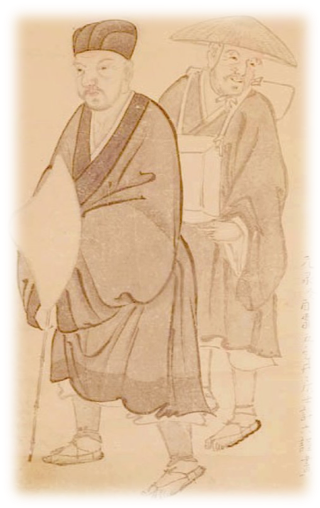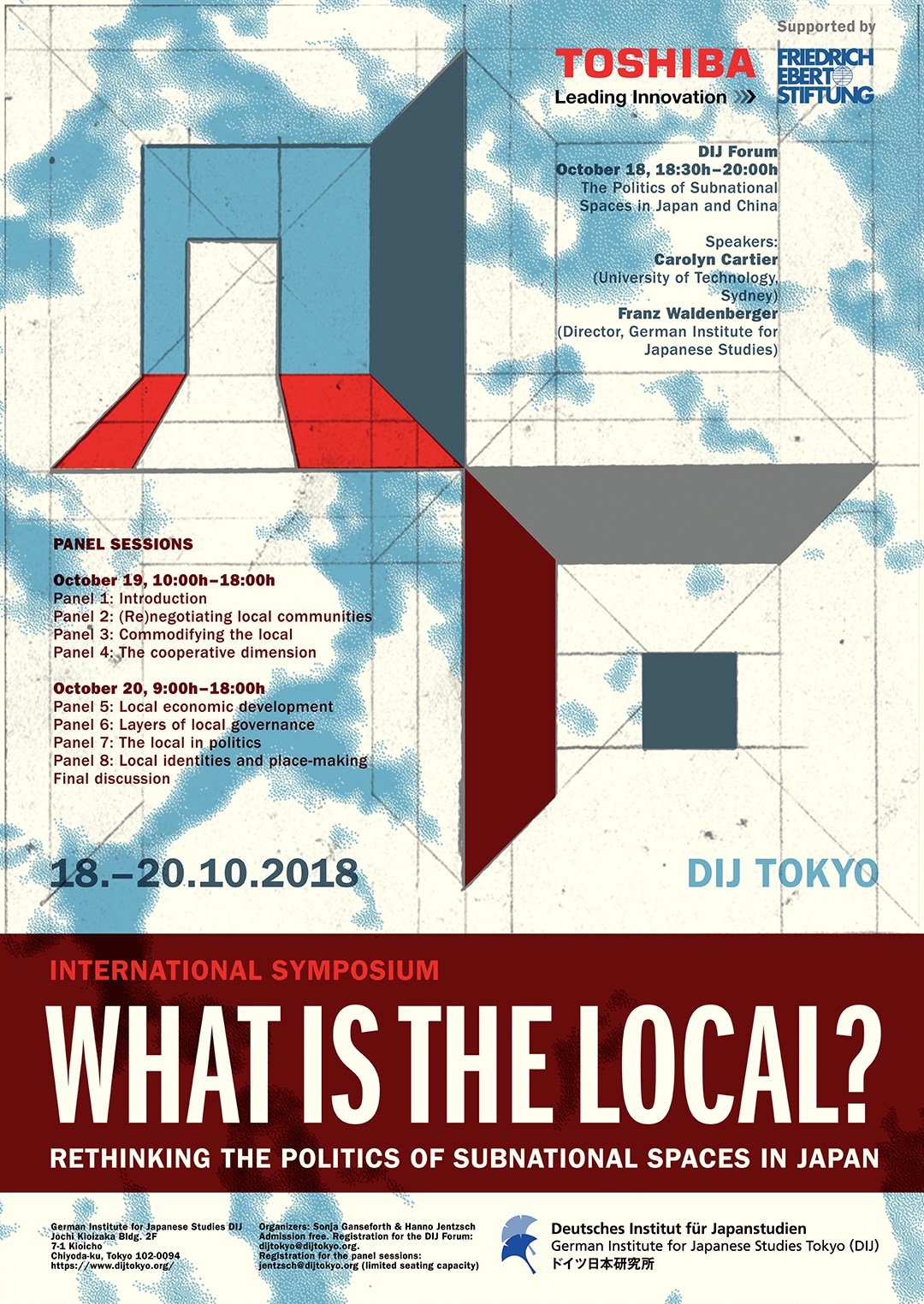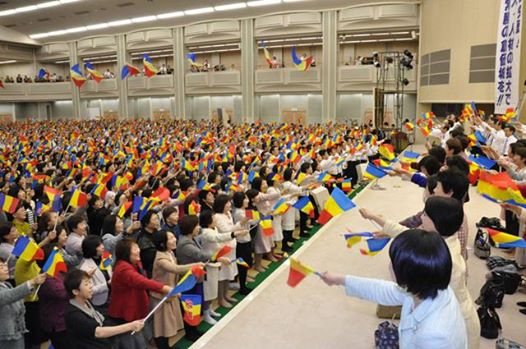イベント&アクティビティ
DIJ Roundtable
Tokyo 2020 and Beyond: Legacies from Hosting the Olympic and Paralympic Summer Games
Hosting the Olympic and Paralympic Games, the greatest media spectacle of modernity, Tokyo will be at the center of the world’s attention in summer 2020. The nearly universal reach via television and internet broadcast provides the IOC with multi-billion dollar revenue streams and the host with opportunities for placing highly visible messages about the state of the nation and its future to the world.
With less than two years ahead of the Games, the DIJ roundtable features three leading experts on sport mega-events to discuss the political economy of hosting the Olympic Games, the difficulties of message control in the post-factual age, and the legacies of the Games for Japan in the 2020s.
Speakers:
Munehiko Harada, Waseda University
John D. Horne, Waseda University
Wolfram Manzenreiter, University of Vienna
共同書籍小展示:
芭蕉と俳句
 日本だけでなく世界でも親しまれている俳句。その中でも松尾芭蕉の作品は芸術性が高く評価され、海外でも広く知られています。
日本だけでなく世界でも親しまれている俳句。その中でも松尾芭蕉の作品は芸術性が高く評価され、海外でも広く知られています。
国際文化会館、日仏会館、ドイツ日本研究所の各図書室では、芭蕉をはじめとした俳句の翻訳書や研究書を展示します。この機会に、数々の俳句の英語版、フランス語版、ドイツ語版をぜひご覧ください。
What is the ‘local’? Rethinking the politics of subnational spaces in Japan
 This symposium aims to enhance the discussion of the “local” as unit of analysis – a discussion that is vital to avoid under-complex approaches to multilayered socio-economic and political phenomena. The focus is on contemporary Japan, which provides a particularly interesting case in this respect, not least due to the massive reorganization of the local administrative landscape in the mid-2000s. The symposium brings together researchers who link different conceptions of the “local” to concrete social, economic, and political problems. Analyzing the (re)configuration and interaction of formal and informal, spatial and social sub-national boundaries will advance the understanding of socio-economic and political organization in and beyond Japan.
This symposium aims to enhance the discussion of the “local” as unit of analysis – a discussion that is vital to avoid under-complex approaches to multilayered socio-economic and political phenomena. The focus is on contemporary Japan, which provides a particularly interesting case in this respect, not least due to the massive reorganization of the local administrative landscape in the mid-2000s. The symposium brings together researchers who link different conceptions of the “local” to concrete social, economic, and political problems. Analyzing the (re)configuration and interaction of formal and informal, spatial and social sub-national boundaries will advance the understanding of socio-economic and political organization in and beyond Japan.
The Politics of Subnational Spaces in Japan and China
Social scientists are frequently concerned with the “local”, including issues such as subnational elections, local governance, the formation of local identities and communities, or local economic “clusters”. However, the social and spatial boundaries of the “local” are often elusive, and subject to change. This seems particularly true in Japan, where local administrative boundaries were abruptly redrawn in a wave of municipal mergers in the mid-2000s, initiating an ongoing process of local socio-spatial readjustments. Beyond the Japanese case, refining our conception of what constitutes a subnational “locality” – its spatial, social, formal and informal boundaries – produces new questions, reveals different stakeholders, and uncovers the impact of social constellations that otherwise remain invisible.
The two speakers will address political and economic consequences implied by differing delineations of subnational spaces in Japan and China.
Speakers:
Carolyn Cartier, University of Technology, Sydney
Franz Waldenberger, German Institute for Japanese Studies
Japanese studies as an occupation: Career planning for Early Career Researchers in theory and practice (A lecture and practical exercise)
Navigating an international research career is a potentially hazardous journey, with many unforeseen challenges and pitfalls to be faced. Japanese Studies like all Area Studies necessarily invites such challenges, as scholars will almost certainly spend long periods on sojourn in radically different scholarly environments. One challenge is to know about and act on institutional expectations and norms with the intention of securing and improving employment opportunities. This is particularly important for early career researchers (ECRs) who may spend long periods on field work or in junior employment in Asia. Moreover, although academics generally insist on evidence based scholarship in their fields of interest, they may rely on personal experience, institutional norms, and hearsay as guides when making decisions in their own organizations. Naturally the decisions that both ECRs and employers make in their respective roles will, in the absence of systematic empirical evidence, be strongly subject to heuristic biases. This research will present quantitative and qualitative evidence from the UK and Japan to inform both ECRs of the potential pitfalls in navigating an international career in academia, and employers in making more informed decisions on hiring junior scholars. It will be followed by a short workshop for participants to support them in working on their own, evidence based, career development planning.
This is a special joint workshop session organized by the DIJ History and Humanities Study Group and the Social Science Study Group designed to encourage conversation among early career scholars.
Speaker:
Peter Matanle, University of Sheffield
Sexuality among Marital and Extra-Marital Couple Relationships in Contemporary Japan
This presentation focuses on the discourses in contemporary Japanese popular media and in the recent Japanese academic literature revolving around sexless (hetero-sexual) couple relationships and extra-marital affairs from 2000 to 2017. In addition, this presentation draws from an interview research conducted with 45 Japanese men and women in their 20s to 40s. The aim of this study is to clarify the transformation and the characteristics of the Japanese sexless phenomenon in conjunction with the rise of extra-marital affairs, by demonstrating how the meaning of sexuality (and its lived behavior) in extra-marital affairs diverges from the social expectations on sexuality within couple relationships.
Speaker:
Alice Pacher, Meiji University
Kōmeitō and Sōka Gakkai’s Transforming Relationship: How Changes in Politics and Religion Affect Japan Today
 Going by statistical measures, Japan is reportedly one of the least religious countries in the world. It is thus striking to observe the seemingly disproportionate impact of religious organizations on Japanese elections, legislation, and policymaking. The most powerful of these groups is Sōka Gakkai, a Buddhism-based lay association whose millions of adherents treat electioneering on behalf of its affiliated political party Kōmeitō (Clean Government Party) as a component of their religious practice. Since its founding in 1964, and particularly since it partnered with the Liberal Democratic Party (LDP) in 1999 in the governing coalition, Kōmeitō has exerted a decisive political influence. And, while the party’s representatives consistently promote Kōmeitō as a brake on LDP efforts toward remilitarizing Japan and revising the 1947 Constitution’s peace clause (Article 9), Kōmeitō has reversed its stance on security issues – a move away from its founding pacifism that has alienated some of its Gakkai supporters.
Going by statistical measures, Japan is reportedly one of the least religious countries in the world. It is thus striking to observe the seemingly disproportionate impact of religious organizations on Japanese elections, legislation, and policymaking. The most powerful of these groups is Sōka Gakkai, a Buddhism-based lay association whose millions of adherents treat electioneering on behalf of its affiliated political party Kōmeitō (Clean Government Party) as a component of their religious practice. Since its founding in 1964, and particularly since it partnered with the Liberal Democratic Party (LDP) in 1999 in the governing coalition, Kōmeitō has exerted a decisive political influence. And, while the party’s representatives consistently promote Kōmeitō as a brake on LDP efforts toward remilitarizing Japan and revising the 1947 Constitution’s peace clause (Article 9), Kōmeitō has reversed its stance on security issues – a move away from its founding pacifism that has alienated some of its Gakkai supporters.
This panel brings together researchers who work from within and outside Kōmeitō and Sōka Gakkai. They will suggest reasons why Sōka Gakkai grew into a political powerhouse; how the party and religion interact in the present; what insights drawn from elections data, archival sources, and ethnographic engagement tell us about where Sōka Gakkai and Kōmeitō may be headed in the near future; and how changes now unfolding within Japan’s politics/religion relations may affect constitutional amendment efforts.
Speakers:
Asayama Taichi, Ritsumeikan University
Axel Klein, University Duisburg-Essen
Levi McLaughlin, North Carolina State University
Scientific Advice in Environmental Politics: A Comparative Study of Japanese Policy-Making
The integration of scientific advice in environmental policy processes is more than ever of great importance: ‘Science translators, ‘knowledge broker’, or ‘intermediaries’ theoretically facilitate the relationship between science and policy (Nowotny, 1993; Litfin, 1994; Young & Osherenko, 1993). However, the manner and degree to which scientific advice is integrated in the policy process differs markedly between countries, and scholarship has yet to fully describe the role of such actors.
This study looks at how scientific advice is integrated in the policy-making process in Japan in comparative perspective by hypothesizing that the degree of such integration, and the provenance of intermediaries acting as knowledge transmitters can explain the problem of lacking independent scientific advice.
Speaker:
Manuela Hartwig, University of Tsukuba








 Open Access
Open Access
